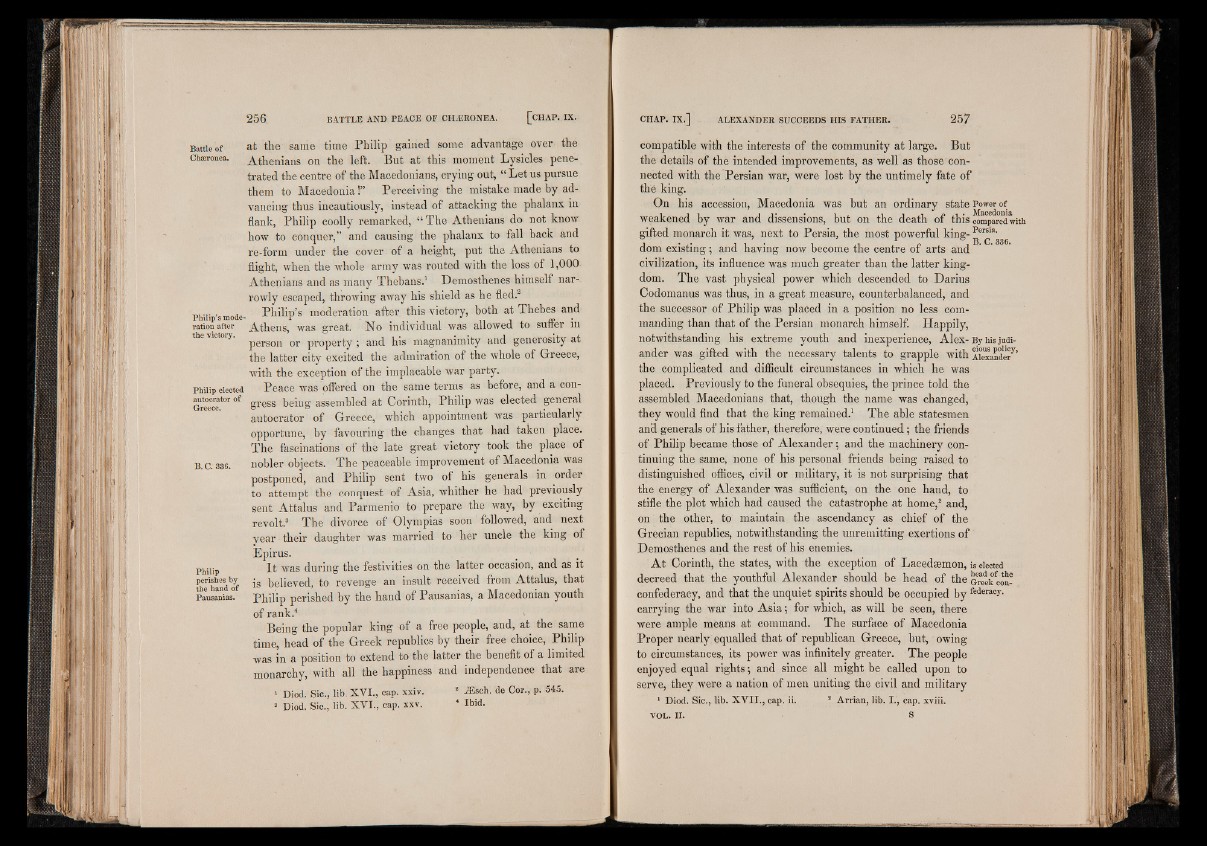
Battle of
Chæronea.
Philip’s moderation
after
the victory.
Philip elected
autocrator of
Greece.
B. C. 336.
Philip
perishes by
the hand of
Pausanias.
at the same time Philip gained some advantage over the
Athenians on the left. But at this moment Lysicles penetrated
the centre of the Macedonians, crying out, “ Let us pursue
them to Macedonia!” Perceiving the mistake made by advancing
thus incautiously, instead of attacking the phalanx in
flank, Philip coolly remarked, “ The Athenians do not know
how to conquer,” and causing the phalanx to fall back and
re-form under the cover of a height, put the Athenians to
flight, when the whole army was routed with the loss of 1,000
Athenians and as many Thebans.1 Demosthenes himself narrowly
escaped, throwing away his shield as he fled.2
Philip’s moderation after this victory, both at Thebes and
Athens, was great. No individual was allowed to suffer in
person or property; and his magnanimity and generosity at
the latter city excited the admiration of the whole of Greece,
with the exception of the implacable war party.
Peace was offered on the same terms as before, and a congress
being assembled at Corinth, Philip was elected general
autocrator of Greece, which appointment was particularly
opportune, by favouring the changes that had taken place.
The fascinations of the late great victory took the place of
nobler objects. The peaceable improvement of Macedonia was
postponed, and Philip sent two of his generals in order
to attempt the conquest of Asia, whither he had previously
sent Attalus and Parmenio to prepare the way, by exciting
revolt.3 The divorce of Olympias soon followed, and next
year their daughter was married to her uncle the king of
-Epirus.
It was during the festivities on the latter occasion, and as it
is believed, to revenge an insult received from Attalus, that
Philip perished by the hand of Pausanias, a Macedonian youth
of rank.4 >
Being the popular king of a free people, and, at the same
time, head of the Greek republics by their free choice, Philip
was in a position to extend to the latter the benefit of a limited
monarchy, with all the happiness and independence that are
> Diod. Sic., lib. X V I., cap. xxiv. 3 ^Esch. de Cor., p. 545.
3 Diod. Sic., lib. X V I., cap. xxv. ‘ Ibid.
compatible with the interests of the community at large. But
the details of the intended improvements, as well as those connected
with the Persian war, were lost by the untimely fate of
thé king.
On his accession, Macedonia was but an ordinary state Power of
weakened by war and dissensions, but on the death of this compared with
gifted monarch it was, next to Persia, the most powerful king-Persia-
dom existing ; and having now become the centre of arts and
civilization, its influence was much greater than the latter kingdom.
The vast physical power which descended to Darius
Codomanus was thus, in a great measure, counterbalanced, and
the successor of Philip was placed in a position no less commanding
than that of the Persian monarch himself. Happily,
notwithstanding his extreme youth and inexperience, Alex- By his judi-
ander was gifted with the necessary talents to grapple with Aiexandery’
the complicated and difficult circumstances in which he was
placed. Previously to the funeral obsequies, the prince told the
assembled Macedonians that, though the name was changed,
they would find that the king remained.1 The able statesmen
and generals of his father, therefore, were continued ; the friends
of Philip became those of Alexander ; and the machinery continuing
the same, none of his personal friends being raised to
distinguished offices, civil or military, it is not surprising that
the energy of Alexander was sufficient, on the one hand, to
stifle the plot which had caused the catastrophe at home,2 and,
on the other, tp maintain the ascendancy as chief of the
Grecian republics, notwithstanding the unremitting exertions of
Demosthenes and the rest of his enemies.
At Corinth, the states, with the exception of Lacedaemon, is elected
decreed that the youthful Alexander should be head of the Gretk coq-
confederacy, and that the unquiet spirits should be occupied by federa(=y-
carrying the war into Asia ; for which, as will be seen, there
were ample means at command. The surface of Macedonia
Proper nearly equalled that of republican Greece, but, owing
to circumstances, its power was infinitely greater. The people
enjoyed equal rights ; and since all might be called upon to
serve, they were a nation of men uniting the civil and military
1 Diod. Sic., lib. X V I I ., cap. ii. 3 Arrian, lib. I., cap. xviii.
VOL. II. S